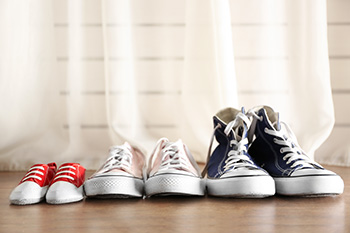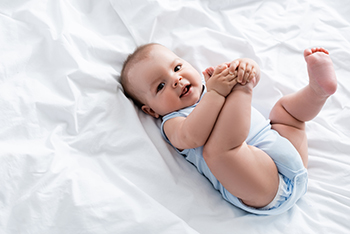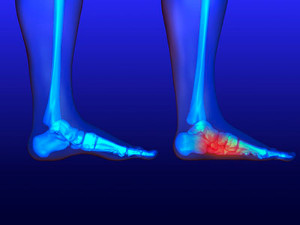Items filtered by date: September 2021
Tips to Make Sure Your Shoes Fit Right
 Good foot care is key to preventing potential foot problems in the future, and wearing shoes that fit properly is important. There are many things that can be done to assure that your shoes fit properly. Because our feet are at their largest at the end of the day, that is the best time to measure the feet. Many people have one foot that is bigger than the other, and it is important to make sure that the shoe fits the larger foot. Another important thing for shoe fitting is to make sure that there is around half an inch of space between your toes and the edge of the shoes. The ball of the foot should fit comfortably at the widest part of the shoe. Lastly, the heels should fit properly without slipping. If you have questions or concerns about making sure that your shoes fit correctly, please consult with a podiatrist.
Good foot care is key to preventing potential foot problems in the future, and wearing shoes that fit properly is important. There are many things that can be done to assure that your shoes fit properly. Because our feet are at their largest at the end of the day, that is the best time to measure the feet. Many people have one foot that is bigger than the other, and it is important to make sure that the shoe fits the larger foot. Another important thing for shoe fitting is to make sure that there is around half an inch of space between your toes and the edge of the shoes. The ball of the foot should fit comfortably at the widest part of the shoe. Lastly, the heels should fit properly without slipping. If you have questions or concerns about making sure that your shoes fit correctly, please consult with a podiatrist.
Finding a properly-fitting shoe is important in reducing injuries and preventing foot problems. For more information about treatment, contact one of our podiatrists from PA Foot & Ankle Associates. Our doctors will treat your foot and ankle needs.
Proper Shoe Fitting
A common concern when it comes to foot health, having properly fitted shoes can help prevent injuries to the foot. Out feet affect our posture and gait, which in turn affects the biomechanics and overall bodily structure. With 33 joints, 26 bones, and over 100 ligaments, the potential for serious injury is much greater than one realizes. Although the feet cease growth in adulthood, they still change shape as they mature. Here are some factors to consider when it comes to investing in proper fitting shoes:
- Be sure the shoes fit correctly right away
- Ensure the ball of your foot fits comfortably in the widest portion of the shoes
- Even though they may look fashionable, improper fitting shoes can either create adverse conditions or exacerbate existing ones you may already have
- Walk along a carpeted surface to ensure the shoes comfortably fit during normal activity
Keeping in mind how shoes fit the biomechanics of your body, properly-fitting shoes are vitally important. Fortunately, it is not difficult to acquire footwear that fits correctly. Be sure to wear shoes that support the overall structure of your body. Do your feet a favor and invest in several pairs of well-fitted shoes today.
If you have any questions please feel free to contact one of our offices located in Allentown, Easton, Northampton, and Chew Street in Allentown, PA . We offer the newest diagnostic and treatment technologies for all your foot and ankle needs.
Babies Can Develop an Ingrown Toenail
 When the corners of the nail on the big toe grow into the outer edges of the skin, it may be indicative of an ingrown toenail. Babies' toenails are typically soft and flexible, and can curve in at the edges. Additional common symptoms of this ailment can include redness, swelling, and the affected toe may be painful. Ingrown toenails may develop as a result of wearing shoes that do not fit correctly or if the toenails are trimmed improperly. If you feel your child may have an ingrown toenail, it is suggested that you consult with a podiatrist who can determine the best treatment for your child.
When the corners of the nail on the big toe grow into the outer edges of the skin, it may be indicative of an ingrown toenail. Babies' toenails are typically soft and flexible, and can curve in at the edges. Additional common symptoms of this ailment can include redness, swelling, and the affected toe may be painful. Ingrown toenails may develop as a result of wearing shoes that do not fit correctly or if the toenails are trimmed improperly. If you feel your child may have an ingrown toenail, it is suggested that you consult with a podiatrist who can determine the best treatment for your child.
Ingrown toenails may initially present themselves as a minor discomfort, but they may progress into an infection in the skin without proper treatment. For more information about ingrown toenails, contact one of our podiatrists of PA Foot & Ankle Associates. Our doctors can provide the care you need to keep you pain-free and on your feet.
Ingrown Toenails
Ingrown toenails are caused when the corner or side of a toenail grows into the soft flesh surrounding it. They often result in redness, swelling, pain, and in some cases, infection. This condition typically affects the big toe and may recur if it is not treated properly.
Causes
- Improper toenail trimming
- Genetics
- Improper shoe fitting
- Injury from pedicures or nail picking
- Abnormal gait
- Poor hygiene
You are more likely to develop an ingrown toenail if you are obese, have diabetes, arthritis, or have any fungal infection in your nails. Additionally, people who have foot or toe deformities are at a higher risk of developing an ingrown toenail.
Symptoms
Some symptoms of ingrown toenails are redness, swelling, and pain. In rare cases, there may be a yellowish drainage coming from the nail.
Treatment
Ignoring an ingrown toenail can have serious complications. Infections of the nail border can progress to a deeper soft-tissue infection, which can then turn into a bone infection. You should always speak with your podiatrist if you suspect you have an ingrown toenail, especially if you have diabetes or poor circulation.
If you have any questions, please feel free to contact one of our offices located in Allentown, Easton, Northampton, and Chew Street in Allentown, PA . We offer the newest diagnostic and treatment technologies for all your foot care needs.
Who Is Susceptible to Developing Sever’s Disease?
 Overuse and repetitive motion is the cause of Sever’s disease. It is a condition that affects the heel of the foot in young children and teenagers, and typically occurs in active people of this age group. It happens as a result of the muscles, tendons, and ligaments pulling on the growth plate in the heel when overuse occurs. Common symptoms that are associated with this condition can consist of heel pain, and it is often worse upon arising in the morning. Effective treatments often begin with temporarily stopping the activity that caused the condition, followed by elevating the affected foot. If you notice your child is limping, please schedule a consultation with a podiatrist who can properly treat Sever’s disease.
Overuse and repetitive motion is the cause of Sever’s disease. It is a condition that affects the heel of the foot in young children and teenagers, and typically occurs in active people of this age group. It happens as a result of the muscles, tendons, and ligaments pulling on the growth plate in the heel when overuse occurs. Common symptoms that are associated with this condition can consist of heel pain, and it is often worse upon arising in the morning. Effective treatments often begin with temporarily stopping the activity that caused the condition, followed by elevating the affected foot. If you notice your child is limping, please schedule a consultation with a podiatrist who can properly treat Sever’s disease.
Sever's disease often occurs in children and teens. If your child is experiencing foot or ankle pain, see one of our podiatrists from PA Foot & Ankle Associates. Our doctors can treat your child’s foot and ankle needs.
Sever’s Disease
Sever’s disease is also known as calcaneal apophysitis, which is a medical condition that causes heel pain I none or both feet. The disease is known to affect children between the ages of 8 and 14.
Sever’s disease occurs when part of the child’s heel known as the growth plate (calcaneal epiphysis) is attached to the Achilles tendon. This area can suffer injury when the muscles and tendons of the growing foot do not keep pace with bone growth. Therefore, the constant pain which one experiences at the back of the heel will make the child unable to put any weight on the heel. The child is then forced to walk on their toes.
Symptoms
Acute pain – Pain associated with Sever’s disease is usually felt in the heel when the child engages in physical activity such as walking, jumping and or running.
Highly active – Children who are very active are among the most susceptible in experiencing Sever’s disease, because of the stress and tension placed on their feet.
If you have any questions, please feel free to contact one of our offices located in Allentown, Easton, Northampton, and Chew Street in Allentown, PA . We offer the newest diagnostic and treatment technologies for all your foot and ankle injuries.
Heel Pain Can Be Treated!
Are Fallen Arches and Flat Feet the Same Thing?
Fallen arches is a term used to describe flat feet that develop during adulthood. This is in contrast to flat feet that are present from early childhood, when the arch of the foot simply doesn’t form. Fallen arches, on the other hand, are not caused by the arch of the foot not developing, but rather by the arch forming and then collapsing over time. This is often due to weakening of the ligament that supports the arch. When the ligament loses its strength, it can no longer hold up the arch and the arch slowly lowers, creating a flat foot. Fallen arches can occur slowly due to the natural wear-and-tear caused by aging, or may be related to an injury. Another common cause is pregnancy, where hormones relax ligaments throughout the body, including those in the feet, which can lead to structural changes. Fallen arches can cause symptoms that range from mild discomfort to significant chronic pain. If you are experiencing foot pain, please consult with a podiatrist.
Flatfoot is a condition many people suffer from. If you have flat feet, contact one of our podiatrists from PA Foot & Ankle Associates. Our doctors will treat your foot and ankle needs.
What Are Flat Feet?
Flatfoot is a condition in which the arch of the foot is depressed and the sole of the foot is almost completely in contact with the ground. About 20-30% of the population generally has flat feet because their arches never formed during growth.
Conditions & Problems:
Having flat feet makes it difficult to run or walk because of the stress placed on the ankles.
Alignment – The general alignment of your legs can be disrupted, because the ankles move inward which can cause major discomfort.
Knees – If you have complications with your knees, flat feet can be a contributor to arthritis in that area.
Symptoms
- Pain around the heel or arch area
- Trouble standing on the tip toe
- Swelling around the inside of the ankle
- Flat look to one or both feet
- Having your shoes feel uneven when worn
Treatment
If you are experiencing pain and stress on the foot you may weaken the posterior tibial tendon, which runs around the inside of the ankle.
If you have any questions please feel free to contact one of our offices located in Allentown, Easton, Northampton, and Chew Street in Allentown, PA . We offer the newest diagnostic and treatment technologies for all your foot and ankle needs.


